The textile industry has witnessed significant advancements in recent years, and one notable innovation is the development of SMS (Spunbond-Meltblown-Spunbond) nonwoven fabric making machines. These cutting-edge machines have revolutionized the production process, enabling manufacturers to create high-quality, versatile, and sustainable fabrics for a wide range of applications. In this article, we will explore the key features and advantages of nonwoven SMS fabric making machines.
Streamlining the Production Process
Nonwoven SMS fabric making machines integrate three essential processes – স্পিনিং, meltblowing, and bonding – into a single streamlined production line. This integration eliminates the need for separate machines or production lines, resulting in improved efficiency, reduced costs, and increased productivity. Manufacturers can now produce SMS fabrics with ease, meeting the growing demand for these versatile materials.

Versatility in Fabric Design and Properties
One of the greatest advantages of nonwoven SMS fabric making machines is the ability to produce fabrics with a range of properties tailored to specific applications. By combining spunbond and meltblown layers, manufacturers can create fabrics with varying weights, strengths, barrier properties, and filtration efficiencies. This versatility allows for the production of fabrics suitable for medical and hygiene products, protective apparel, filtration media, geotextiles, and more.
Enhanced Barrier Properties
SMS fabrics are known for their exceptional barrier properties, which make them ideal for applications that require protection against liquid droplets, particles, bacteria, and viruses. The meltblown layer in SMS fabrics creates a dense web of fine microfibers, effectively blocking the passage of contaminants while maintaining breathability. nonwoven SMS fabric making machines enable manufacturers to produce fabrics with enhanced barrier properties, ensuring the safety and well-being of end-users.
Strength and Durability
The combination of spunbond and meltblown layers in SMS fabrics results in fabrics with superior tensile strength and tear resistance. nonwoven SMS fabric making machines enable the production of fabrics that are strong, yet lightweight. This makes them suitable for applications that require durability, such as automotive and construction materials, while also allowing for flexibility and ease of use.
Sustainability and Cost-effectiveness:
Nonwoven SMS fabric making machines offer sustainable solutions to the textile industry. The integration of processes in a single machine reduces material waste, energy consumption, and labor costs. Additionally, SMS fabrics can be produced using recyclable materials and can incorporate recycled content, contributing to the circular economy and reducing environmental impact. The cost-effectiveness of nonwoven SMS fabric making machines makes them an attractive choice for manufacturers looking to optimize their production processes and achieve long-term sustainability goals.
Application of Nonwoven এসএমএস Fabric Making Machine
এসএমএস (Spunbond-Meltblown-Spunbond) nonwoven fabric making machines are versatile and widely used in various industries. Here are some applications of nonwoven SMS fabric made using these machines:
- Medical and Hygiene Products: SMS fabrics are commonly used in the production of medical and hygiene products such as surgical gowns, drapes, masks, caps, জুতা কভার, disposable bed sheets, and diapers. The combination of spunbond and meltblown layers provides excellent barrier properties, ensuring protection against liquid droplets, bacteria, and viruses.
- প্রতিরক্ষামূলক পোশাক: SMS fabrics are utilized in the manufacturing of protective apparel for industrial workers, healthcare professionals, and emergency responders. These fabrics offer protection against hazardous substances, chemicals, and particulate matter, while maintaining breathability and comfort.
- Filtration Media: SMS fabrics are employed in filtration applications, including air filters, liquid filters, and face mask filters. The fine microfibers created during the meltblowing process enhance the filtration efficiency of the fabric, effectively capturing particles and contaminants.
- Geotextiles: SMS fabrics find application in geotextiles, which are used in civil engineering and construction projects. These fabrics provide separation, filtration, drainage, and reinforcement functions. They are used in road construction, erosion control, landfills, drainage systems, and other geotechnical applications.
- Automotive Interiors: SMS fabrics are used in automotive interiors to create durable, lightweight, and aesthetically pleasing materials. They are used for headliners, door panels, trunk linings, seat covers, and carpet backings. The strength and barrier properties of SMS fabrics make them suitable for automotive applications.
- Agriculture Covers: SMS fabrics are utilized in agriculture for crop protection, weed control, and greenhouse coverings. These fabrics provide a physical barrier against insects, pests, and adverse weather conditions while allowing air, light, and moisture to penetrate.
- Packaging: SMS fabrics are used in packaging applications such as tote bags, shopping bags, and gift wrapping. The fabric’s strength, স্থায়িত্ব, and customizable properties make it an eco-friendly alternative to traditional packaging materials.
- Wipes and Cleaning Products: SMS fabrics are used in the production of wipes and cleaning products. The fabric’s softness, absorbency, and strength make it suitable for various cleaning applications, including household cleaning, industrial cleaning, and personal care wipes.
- Furniture Upholstery: SMS fabrics can be used for furniture upholstery, providing a combination of comfort, স্থায়িত্ব, and easy maintenance. These fabrics offer stain resistance, colorfastness, and resistance to wear and tear.
- Environmental Protection: SMS fabrics find application in environmental protection projects, such as oil spill cleanup, riverbank erosion control, and sediment control. The fabric’s filtration and barrier properties help contain pollutants and prevent environmental damage.
The advent of nonwoven SMS fabric making machines has transformed the textile industry by enabling the efficient production of versatile, high-quality fabrics with enhanced barrier properties. These machines streamline the production process, offering manufacturers the ability to create fabrics tailored to specific applications. With their strength, স্থায়িত্ব, sustainability, এবং খরচ-কার্যকারিতা, nonwoven SMS fabric making machines have become indispensable tools in the production of fabrics for medical, hygiene, protective, and various other industries. As technology continues to advance, we can expect even more innovations in fabric production, shaping the future of the textile industry.
